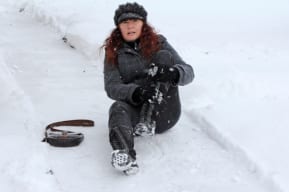
Recent record-setting snows in upstate New York indicate that there is an icy winter ahead for New York, New Jersey and the entire Northeast. As the wintry weather arrives, property owners – especially business owners – will need to keep in mind that there comes a responsibility to guard against slip-and-fall risks.
Under certain circumstances, a person who slips or falls and suffers an injury due to ice and snow may sue the property owner and hold the owner liable for medical expenses and other losses. In some cases, a contractor responsible for clearing snow and ice may also be held liable.
Generally, such a case may proceed if the injured person had a right to be on the property and was reasonably careful as he or she walked on a slippery surface, and if the property owner was negligent in responding to the buildup of snow and ice.
How Premises Liability Law Applies to Snow-and-Ice Hazards
Generally speaking, under premises liability law, property owners have a duty to ensure their properties are safe for those who visit. They are to eliminate safety hazards within a reasonable amount of time or to provide adequate warning that a hazard exists if it cannot be eliminated right away.
The buildup of snow and ice is a hazard that a property owner needs to eliminate or mitigate – such as by shoveling or spreading salt or sand – in a reasonable amount of time in order to prevent slip-and-fall accidents. This includes snow and ice on sidewalks, steps, parking lots and other walkways.
The burden of providing safe premises falls more heavily on business owners than on residential property owners. This is because businesses essentially ask people to enter their properties.
New Jersey courts have indicated that businesses have an “absolute” duty to the safety of customers or potential customers. Similarly, operators of places that are open to the public such as parks, shopping centers, hospitals and apartment complexes with “common” areas also have a duty of safety toward visitors that is typically higher than that of a homeowner.
In states like New Jersey, which regularly gets winter snow and ice, some municipalities have ordinances that provide a specific amount of time after a snowfall or similar inclement weather ends in which a business property owner must take steps to restore safety.
However, in addition to the property owner’s responsibilities, the person who has slipped and fallen and suffered an injury has a responsibility for his or her own safety as well. Even an invited visitor to a business or another property is obligated to exercise care to avoid reasonably foreseeable risks.
Snow and ice are understood to present a slip-and-fall hazard, particularly right after winter weather events. However, someone who was running when her or she slipped and fell on a patch of ice – to cite an extreme example – may have little standing for a lawsuit.
The bottom line: If you have been significantly injured in a fall on someone else’s property, you should contact an attorney to receive a review of your case and an assessment of your legal rights and options.
- About the Author
- Latest Posts
Since 1981, the compassionate personal injury lawyers at Davis, Saperstein & Salomon have been delivering results for our deserving clients. We are solely committed to helping injured individuals, never representing corporations. No matter how large or small your personal injury case is, you can trust that it is important to us.












